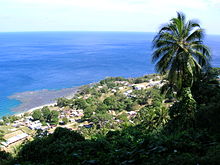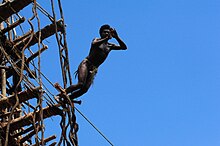Pentecost (island)
Pentecost is most famous for being the spiritual birthplace of the extreme sport of bungee jumping, originating in an ages old ritual called the Gol (Bislama nanggol), or land diving.Between April and June every year, men in the southern part of the island jump from tall towers (around 20 to 30 metres, 70 to 100 ft)[citation needed] with vines tied to their feet, in a ritual believed to ensure a good yam harvest.Land diving was first given international exposure when David Attenborough and a BBC film crew brought back footage of the ritual during the 1950s, which aired as part of The People of Paradise documentary series.Major settlements along the west coast include (from north to south): Laone, Abwatuntora, Loltong, Latano, Nambwarangiut, Namaram, Bwatnapni, Melsisi, Ranwadi, Waterfall (Vanuu), Baravet, Lonoror, Hotwata, Panas, Wali, Panngi and Ranputor.Away from the coast, there are major settlements at Nazareth and Atavtabangga in the north, and at Enaa, Wutsunmwel, Tanbok, Naruwa, Ubiku and Tansip in the centre of the island.Major villages on the eastern side of the island include Ranwas, Bunlap and Baie Barrier (Ranon) in the south-east, and Renbura and Vanrasini further north.Manioc (cassava), yams, bananas, kumala (sweet potato), coconuts, island cabbage, pawpaw (papaya), nakavika (rose apples), citrus, sugar cane, cacao, mangoes, pineapples, nuts, and European vegetables are also grown for local consumption.Vegetables are often grated into a paste, wrapped in large leaves, baked in an earthen oven and covered with coconut cream to create 'laplap', a savoury pudding.Pigs are highly important in Pentecost society, not only as food but as a traditional item of value, which may be given as payment during marriage ceremonies or as compensation for transgressions.


Pacific OceanNew HebridesProvincePenamaNi-VanuatuSouth PacificVanuatuPort VilaFrenchBislamalivestockPedro Fernandez de QuirosPentecostLouis Antoine de BougainvilleCaptain James CookChristianmissionariesLand divingbungee jumpingacceptance into manhoodDavid AttenboroughThe People of ParadisePope John Paul IIQueen Elizabeth IIWalter LiniTuraga indigenous movementkastomgrade-takingsocial statusanthropologistsMelsisiRanwadiBaravetLonororPanngisubsistence agriculturecash cropsvegetablestaple foodcassavabananassweet potatococonutscabbagepapayarose applescitrussugar canemangoespineapplesEuropeanearthencoconut creamlaplapsavourypuddingsocietyitem of valueLuganvillebamboothatchednatangguraLonorore AirportSara AirportpidginEnglishMotarilavoa Hilda Lin̄iTuraga nationStuff.co.nzWayback MachineIslandsProvinces of VanuatuMalampaAkhambAmbrymAtchinLeumanangLopeviMalakulaMaskelyne IslandsNorsupTommanUluveoUripivVulaïAsulekaBokissaDany IslandElephant IslandEspiritu SantoLataroLataroaMalokilikiliMalotinaMalparavuMaltineravaMalvapevuMalwepeTangoaTutubaUrelapaBuningaEkapum LepErakorEratapEretokaErueti LepFatumialaIririkiIriwiti LepKakulaLelepaMakuraMatasoNamukaTefalaTongarikiTongoaAneityumErromangoFutunaInyeugVete Manung (Goat Island)KwakéaMerelavaMetoma
